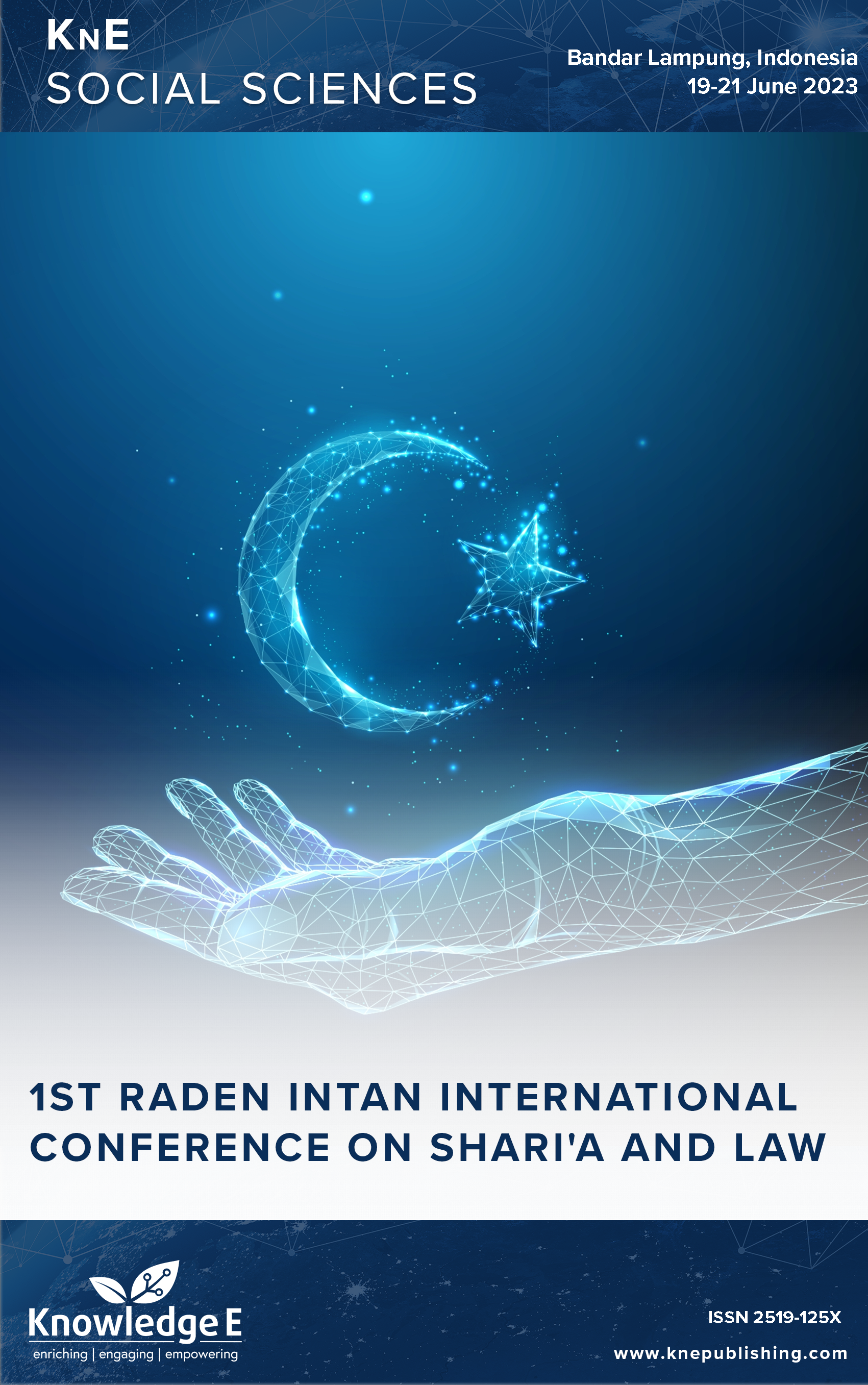Reform from Within: Efforts by Kadhis' Courts in Kenya to Empower Muslim Women's Access to Matrimonial Property and Divorce Settlements Rights
DOI:
https://doi.org/10.18502/kss.v9i2.14974Abstract
When the relationship ends through divorce or separation, Muslim married women risk losing their share of the matrimonial property and other marital rights after divorce. As a result, Muslim widowed women lose the rights to ownership, control, and access to properties they enjoyed during their marriage life. The application of Muslim personal law (MPL) in the Kadhis’ courts in Kenya, similar to other jurisdictions, is highly dependent on social customs that to a great extent hinders women’s access to their rights after divorce. Previously, Muslim women appearing before the Kadhis’ courts in Kenya would persevere their marital sufferings and submit to patriarchal norms of male priority, authority, and power. Current religious underpinnings of MPL in the Kadhis’ courts in Kenya demonstrate a continuing change in Muslim religious courts toward expanding Muslim women’s access to justice. Neo-Kadhis are influenced by contemporary Muslim legal opinions and conventional legal trends and constitutional instruments such as the Constitution of Kenya 2010 that provides for gender equality, including equality in ownership of property, and prohibits the state from making laws that arbitrarily deprive a person of property or the enjoyment of the rights/interests over property on any discriminatory grounds. The Neo-kadhis are pioneering the reform process that adopts a progressive approach in responding to emerging legal issues related to women litigants’ rights to matrimonial property rights and divorce settlements rights in the form of Mata’a (consolatory gift) as opposed to the prevalent Islamic traditional approach in Muslim religious courts. Influenced by conventional court decisions, recent cases decided by the Neo-Kadhis in Kenya consider wives’ day-to-day household activities and monetary contributions in assessing matrimonial property rights after divorce. This paper examines the dynamics of the progressive approach adopted by the Neo-Kadhis in Kenya toward enhancing women’s access to justice rights and gender relations in Muslim religious courts in Kenya and beyond.
Keywords: Access to matrimonial rights, divorce settlement rights, Kadhi’s courts, Muslim women, Islamic family law, Ken
References
Quran 2:237
International Islamic Committee for Women & Child (IICWC). The Islamic Charter on Family, Translated by Heather Shaw, 2007 C.E. – 1428 A.H. http://www.iicwc.org/lagna/iicwc/iicwc.php?id=872, p.149
Narrated by Ahmad and authenticated by al-Tirmidhi.
Ibn al Qayyim, Zaad al Maad 5/ 438
Ibn al Qayyim, Zaad al Maad 5/ 438
International Islamic Committee for Women & Child (IICWC). The Islamic Charter on Family, Translated by Heather Shaw, 2007 C.E. – 1428 A.H. http://www.iicwc.org/lagna/iicwc/iicwc.php?id=872, p.91.
Al Imam al-Shawkani, Nayl al Awtar, Al Imam al-Shawkani.
1944 EACA 4
1919/1921 8 EALR 200
1060 EA 801 see also Yasmin v. Mohamed EA 370
Civil Appeal 123 of 1997 at Mombasa (unreported)
eKLRhttp://www.kenyalaw.org accessed on 17 September 2016
FAA v IAM eKLR
DAJ v HMA eKLR
M.K.D v. N.I.K.H, Kadhi Court, Nairobi (unreported).
Al-Azhar University in cooperation with the United Nations Children’s Fund (UNICEF), Children in Islam. Their Care, Upbringing and Protection. Al-Azhar University; 2005. p. 1.
Ridha, Huquq an Nisaa fi Al-Islam. Beirut: Al-Maktab al-Islami; 1984. p. 167.
Imam Shafi‘i, Kiatb al-Umm.
Sayyid Abdulrahman ibn Muhammad, Bughyat al Mustarshidin, p.159.
Uthman ibn Shattaa al Bakriy, I’anatu al-Talibin, Hashiya (marginal notes) on the text Fathul Mu’iin, by Al-Maliybaariy.
For instance, Quran Chapter 65 verse 6.
Shukri A. Muslim Law of Marriage and Divorce. Gorgias Press; 2009. p. 81.
Shukri A. Muslim Law of Marriage and Divorce. Gorgias Press; 2009. p. 82.
Shukri A. Muslim Law of Marriage and Divorce. Gorgias Press; 2009. p. 80. DOI: https://doi.org/10.31826/9781463212919
For instance, Quran Chapter 2 verse 188
Taqi al-Din Ahmad Ibn Taymiyyah Majmu al Fatawa, Vol. 33 page 58 -59.
Abu Zahra M. Al-Ahwal al-Shakhsiyyah. Cairo: Dar al-Fikr al-Arabi; 1957. p. 167.
Al Qayyim I. al-Turuq al-Hukmiyyah Fi al-Siyasah-al-Shariyyah, Cairo: Matba’ah Al- Madani, 1961, p. 24.
Sabiq S, al-Sunnah F. 2/ p.174, Printed in 1981 Darul Fikr, Beirut, Lebanon
Rwezaura BA. The Court of Appeal of Tanzania and the Development of the Law of Domestic Relations. East Africa Law Review. 1989 Dec;16(2):148.
AWM v JGK eKLR
PNN v ZWN eKLR
EWCA Civ J1129-2
Civil Appeal 101 of 1995 at Nairobi (unreported).
This is a similar view that was adopted by the Court of Appeal of Tanzania in the case of Bi Hawa Mohamed v. Ally Sefu in which the Court of Appeal held that a spouse’s domestic services, rendered during the subsistence of the marriage, amounted to an “effort” and are a “contribution” within the provisions of Section 114 of the Tanzanian Law of Marriage Act.
R.M.M v B.A.M http://www.kenyalaw.org, Civil Appeal NO. 267 OF 2011, Waki, G.B.M. Kariuki, Mwilu, M’inoti&Murgor, JJ.A
R.M.M v B.A.M http://www.kenyalaw.org, Civil Appeal NO. 267 OF 2011, Waki, G.B.M. Kariuki, Mwilu, M’inoti&Murgor, JJ.A
Essa v. Essa (1996) EA 53.
OS No 3 of 2015 (Mombasa), EMK v SSS, [unreported].
AWA v HDD eKLR
Hussein Sheikh Bashir v. Hassida Mohamed Ali, Kadhi’s Court at Kibera, Nairobi, 2014(unreported).
HSJ v SAA eKLR
Al Albany in his Irwa’ul Ghalil at page 1459.
FM v AW eKLR
Amina Hassan Ahmed v. Yussuf Adan Abdulla, Civil Case No. 143 Of 2014, Kadhi Court, Upperhil, (unreported).
Abu Zahra M. Al-Ahwal al-Shakhsiyyah. Cairo: Dar al-Fikr al-Arabi; 1957. p. 167.
Tafsir Al-?abari, Surat al-Azhzab, Chapter 33 verse 28
Al-Sayyis MA. Tafsir Ayat Al- Ahkam. Cairo: Al-Maktabah al-Asriya; 2002.
Ridha MR. Huquq an Nisaa fi Al-Islam. Beirut: Al-Maktab al-Islami; 1984. p. 167.

